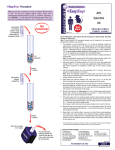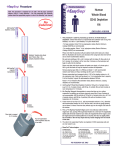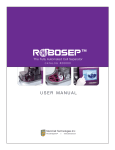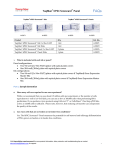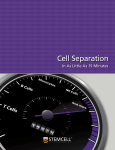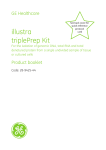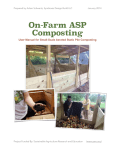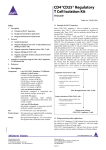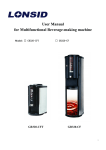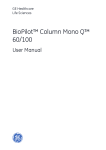Download “Do-It-Yourself” Selection Kit
Transcript
Note: This procedure is designed for use with the EasySep® Magnet (18000). If using “The Big Easy” EasySep® Magnet (18001), please refer to www.stemcell.com/ technical/18001-PIS.pdf for additional instructions. If using RoboSep® - The Fully Automated Cell Separator, please select the appropriate program or refer to the RoboSep® user manual after completing Part A - Cocktail Assembly and Part B Step 1. Part A “Do-It-Yourself” Selection Procedure: Kit Add EasySep® component A and mix Tube containing 15 µg mouse IgG1 antibody C ATA L O G # 1 8 0 9 8 Version 2.0.1 The EasySep® “Do-It-Yourself” Selection Kit contains all of the necessary components to create a specific EasySep® positive selection cocktail when mixed with your own mouse IgG1 monoclonal antibody. This selection cocktail, along with the EasySep® Magnetic Nanoparticles and EasySep® Magnet or RoboSep®, can then be used to positively select cells with the cell surface antigen recognized by your mouse IgG1 monoclonal antibody (See EasySep® Labeling on reverse). Note: EasySep® “Do-It-Yourself” Selection Kit is not recommended for selection of mouse cells. An appropriate species-specific Fc blocking antibody (not supplied) may be required to achieve desired purities by minimizing nonspecific binding to monocytes and macrophages. PART A - COCKTAIL ASSEMBLY PROCEDURE Add EasySep® component B and mix Incubate at 37°C 5 hours to overnight Bring to a final volume of 1 mL and transfer to provided RoboSep®-compatible vial, if needed. EasySep® Positive Selection Cocktail is now ready for use in Part B. Part B Add EasySep® positive selection cocktail from Part A to single cell suspension Cell suspension Incubate 15 minutes Add EasySep® magnetic nanoparticles Incubate 10 minutes Note: Components must be added in the proper order. 1. Add 15 µg of your mouse IgG1 monoclonal antibody* dissolved in your buffer of choice to a 1.5 mL polypropylene (microcentrifuge) tube. Record the volume. The total volume of antibody must not exceed 800 µL (i.e. antibody concentration must be at least 19 µg/mL). 2. Add 100 µL of component A to the vial. Mix well. 3. Add 100 µL of component B to the vial. Mix well. Tightly cap the vial and place it into a 37°C incubator or water bath for five hours or overnight. 4. Bring the vial to a final volume of 1.0 mL by adding the appropriate volume of sterile phosphate buffered saline. 5. This cocktail is now ready for use in the manual EasySep® sytem. If using RoboSep®, transfer the cocktail to the empty vial provided. The cocktail is stable for at least 1 year at 4°C. Do not freeze the cocktail. PART B - CELL SELECTION PROCEDURE 1. This procedure is used for processing up to 5 x 108 cells per separation. Some modification may be necessary for optimal results (see Notes and Tips on reverse side). Prepare nucleated cell suspension at a concentration of 1 x 108 nucleated cells/mL in recommended medium (see Notes and Tips). For rare cells, start with a concentration of 2 x 108 cells/mL (see Notes and Tips - Optimizing Purity). Cells must be in a 12 x 75 mm polystyrene tube in order to properly fit into the EasySep® Magnet. Do not exceed a volume of 2.5 mL per tube. For samples containing 1 x 107 cells or fewer, resuspend in 100 µL. Falcon™ 5 mL Polystyrene Round-Bottom Tubes (Becton Dickinson, Catalog #352058) are recommended. Note: If using RoboSep®, species-specific blocker should be added to the cells before they are loaded into the carousel. See below for details. 2. Add species-specific FcR blocking antibody if required, at a final concentration of 0.5 to 3.0 µg/mL and mix well. 3. Add the positive selection cocktail that has been assembled in Part A to the cell suspension at 100 µL/mL cells (e.g. for 2 mL of cells, add 200 µL of cocktail). Mix well and incubate at room temperature for 15 minutes. 4. Mix EasySep® Magnetic Nanoparticles to ensure that they are in a uniform suspension by pipetting up and down more than 5 times. Vortexing is not recommended. Add nanoparticles at 50 µL/mL cells (e.g. for 2 mL of cells, add 100 µL of nanoparticles). Mix well and incubate at room temperature for 10 minutes. 5. Bring cell suspension to a total volume of 2.5 mL by adding recommended medium. Mix the cells in the tube by gently pipetting up and down 2 - 3 times. Place the tube (without cap) into the magnet. Set aside for 5 minutes (increasing separation time to 6 - 10 minutes may increase recovery - see Notes and Tips). 6. Pick up the magnet, and in one continuous motion, invert the magnet and tube, pouring off the supernatant fraction. The magnetically labeled cells will remain inside the tube, held by the magnetic field of the EasySep® Magnet. Leave the magnet and tube inverted for 2 - 3 seconds then return to upright position. Do not shake or blot off any drops that may remain hanging from the mouth of the tube. 7. Remove the tube from the magnet and add 2.5 mL of recommended medium. Mix the cell suspension by gently pipetting up and down 2 - 3 times. Place the tube back in the magnet and set aside for 5 minutes. 8. Repeat Steps 6 and 7, and then Step 6 once more, for a total of three 5-minute separations in the magnet (for rare cells, additional rounds of separation may improve purity - see Notes and Tips). Remove tube from magnet and resuspend cells in an appropriate amount of desired medium. The positively selected cells are now ready for use. *Users of this selection kit should ensure that they are entitled to use the antibody of interest. StemCell Technologies is not responsible for patent infringements or violations that may occur when using this product. Place tube in magnet for 5 minutes Pour off supernatant. Positively selected cells remain in tube. After two rinses, collect cells simply by removing tube! StemCell Technologies In North America Tel: 1.604.877.0713 Fax: 1.604.877.0704 Toll Free Tel: 1.800.667.0322 Toll Free Fax 1.800.567.2899 e-mail: [email protected] www.stemcell.com In the United Kingdom Tel: +44.(0).20.7691.3561 Fax: +33.(0).4.76.18.99.63 Toll Free within United Kingdom: Tel: 0800.731.27.14 Fax: 0800.731.27.13 e-mail: [email protected] In Europe Tel: +33.(0).4.76.04.75.30 Fax: +33.(0).4.76.18.99.63 e-mail: [email protected] May 2007 FOR RESEARCH USE ONLY #28863 Printed on recycled paper. Catalog #18098 For labeling 109 total cells Components: • EasySep® “Do-It-Yourself” Component A 0.1 mL 0.1 mL • EasySep® “Do-It-Yourself” Component B • EasySep® Magnetic Nanoparticles 1.0 mL • RoboSep® Vial for “Do-It-Yourself” Antibody Cocktail (not required for manual use) 1 vial REQUIRED EQUIPMENT: EasySep® Magnet (Catalog #18000) or “The Big Easy” EasySep® Magnet (Catalog #18001), or RoboSep® (Catalog #20000). PRODUCT DESCRIPTION AND APPLICATIONS: EasySep® "Do-It-Yourself" Selection Components A and B create bispecific Tetrameric Antibody Complexes (TAC) when mixed together with a mouse IgG1 monoclonal antibody. Cells that express the surface antigen that is recognized by the mouse IgG1 monoclonal antibody are then targeted for magnetic separation using the EasySep® Magnetic Nanoparticles and EasySep® Magnet. EASYSEP® LABELING OF CELLS: Target cells are specifically labeled with dextran-coated magnetic nanoparticles using bispecific Tetrameric Antibody Complexes (TAC). These complexes recognize both dextran and the target cell surface antigen recognized by your own mouse IgG1 antibody (Figure 1). The small size of the magnetic dextran iron particles allows for efficient binding to the TAC-labeled cells, and does not interfere with subsequent FACS analysis. Magnetically labeled cells are then separated from unlabeled cells using the EasySep® procedure (reverse side). Figure 1. Schematic Drawing of EasySep® Magnetic Labeling of Cells. Your own mouse IgG1 antibody is shown in red. NOTES AND TIPS: Preparing a Mononuclear Cell Suspension. Prepare a mononuclear cell suspension from whole peripheral blood by Ficoll-Paque™ PLUS density separation (Catalog #07957). Previously frozen mononuclear cells should be incubated with 100 µg/mL DNase I (Catalog #07900) in buffer without EDTA for at least 15 minutes at room temperature prior to labeling and separation to reduce clumping. Filter clumpy suspensions through a 70 µm mesh nylon strainer for optimal results. If desired cell type is to be selected from other sources/tissues, ensure that cells are in a single cell suspension for optimal results. Recommended Medium. The recommended medium is PBS with 2% FBS (Catalog #07905) and 1 mM EDTA. Medium should be Ca++ and Mg++ free. Optimizing Purity. For samples with a desired cell starting frequency of less than 10-15%, additional separation rounds will likely improve purity. If desired, repeat Steps 6 and 7 an additional one to three times. Please note that recovery will decrease with each additional round of separation. Also, for rare cells (i.e. cells representing less than 5% of the initial population), increasing initial cell concentration from 1 x 108 cells/mL to 2 x 108 cells/mL may improve purity. Optimizing Recovery. Recovery may be improved by increasing separation time in the magnet from 5 to 10 minutes for each round. Recovery of positively selected cells is also dependent on the quality of the mouse IgG1 antibody used in the cocktail created with the EasySep® “Do-It-Yourself” Selection Kit. Antibodies that have expired or that have been stored improperly may show lower affinity for the surface marker on the target cell, resulting in lower recovery. Product Information Sheet. Assessing Purity. The mouse IgG1 antibody used in the cocktail created with the EasySep® “Do-It-Yourself” Selection Kit may block other fluorochrome-conjugated antibodies that are used to assess purity by flow cytometry. We recommend using fluorochrome-conjugated antibody clones that are not blocked by the antibody clone used in the TAC. If this is not possible, one of the following methods can also be used to assess purity: 1. Add fluorochrome-labeled antibodies at the same time as the cocktail: Add the fluorochrome-conjugated antibody at a concentration of 0.150.4 µg/mL immediately after adding the cocktail to provide a strong detection signal without affecting separation performance. This method labels the positive cells in the entire sample. 2. Use a secondary fluorochrome-conjugated antibody, such as FITClabeled sheep anti-mouse IgG. 3. Use alternate markers, if applicable. COMPONENT DESCRIPTIONS: code #18090 EasySep® “Do-It-Yourself” Component A Contains a mouse monoclonal antibody directed against dextran. This antibody has been purified from hybridoma culture supernatant by affinity chromatography using Protein A or Protein G Sepharose. The mouse monoclonal antibody subclass is IgG1. Supplied in phosphate buffered saline. EasySep® “Do-It-Yourself” Component B code #18091 Contains a rat monoclonal antibody directed against the Fc region of Mouse IgG1. This antibody has been purified from hybridoma culture supernatant by affinity chromatography using Protein A or Protein G Sepharose. Supplied in phosphate buffered saline. EasySep® Magnetic Nanoparticles A suspension of magnetic dextran iron particles in water. code #18150 RoboSep® Vial for “Do-It-Yourself” Antibody Cocktail code #18093 Empty vial compatible with RoboSep® - the fully automated cell separator. If using RoboSep®, transfer the antibody cocktail assembled in Part A into this empty vial before loading into the appropriate position in the RoboSep® carousel. If not using RoboSep®, this vial can be discarded. STABILITY AND STORAGE: EasySep® “Do-It-Yourself” Components A and B Stable at 4°C for 1 year. Do not freeze these products. Contents sterile in unopened tube. EasySep® Magnetic Nanoparticles Stable at 4°C for 2 years. Contents sterile in unopened tube. This product may be shipped at room temperature, and should be refrigerated upon receipt. Ficoll™ and Ficoll-Paque™ PLUS are trademarks of GE Healthcare Ltd. StemCell Technologies In North America Tel: 1.604.877.0713 Fax: 1.604.877.0704 Toll Free Tel: 1.800.667.0322 Toll Free Fax 1.800.567.2899 e-mail: [email protected] www.stemcell.com In the United Kingdom Tel: +44.(0).20.7691.3561 Fax: +33.(0).4.76.18.99.63 Toll Free within United Kingdom: Tel: 0800.731.27.14 Fax: 0800.731.27.13 e-mail: [email protected] FOR RESEARCH USE ONLY In Europe Tel: +33.(0).4.76.04.75.30 Fax: +33.(0).4.76.18.99.63 e-mail: [email protected] #28863 Printed on recycled paper.


